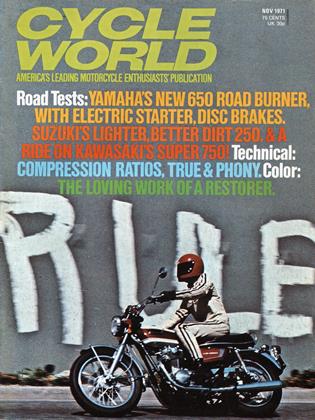THE SCENE
IVAN J. WAGAR
A little guy with funny pointy-toed shoes came to visit me one day at the old CW office in Long Beach. No muss, no fuss or phone calls; he just walked out of the beehive we call Los Angeles airport, found a bus with Long Beach on the front and proceeded down to our office.
The guy was Kel Carruthers, Australian motorcycle road racing champion, and with his long Australian drawl, he introduced the leathery old gent with him as his father, Jack. That was five years ago, and Kel, already at an age when most riders think about hanging up their leathers, was on his way to Europe for the first time. Over the following couple of days, as we hit Disneyland and a few of the other local spots, my wife and 1 gradually began to understand “Strine” (the native language of Australia), and we were more able to communicate with the fatherand-son duo. In Strine, such things as “my father” comes out as “meedide.” And, compared to Jack, we found that Kel really didn’t have much of an accent after all. It was only a little difficult to understand Kel, but it was impossible to understand Jack.
We talked about Kel’s complete domination of Australian road racing with an old 250 Honda Four; in races where moving up into the next class was permitted, it was not uncommon for him to sweep the board. Although the factory had loaned the machine to the importer, there were very few spare parts, and just about everything had to be made in the Carruthers workshop. Knowing the 250 screamers had a crankshaft life of only about 250 racing miles, at which point a factory rebuilt unit was installed, 1 asked Kel how they had kept the machine running so long, and the reply was “meedide mide a crinke.” The story was true. Given the shop facilities, Kel and his father can make just about any part for any engine ever built.
During his brief visit, in addition to learning Strine, we got to know something about the strong inner drive and determination of the likeable little Aussie. He was going to Europe to become world champion, and that was all there was to it. As he put it, “I can’t afford to go to Yurp for a vy-ky-shun.” With the scarcity of factory machines Kel had a tough row to hoe in Europe. He did, however, put in consistent rides, rarely crashed, and won some fairly important non-grand prix events. The big break came in 1969. Benelli needed a back-up for Pasolini at the Isle of Man, and offered Kel the spare Four for the 250 race. Backed by his experience on the Honda in Australia, and knowing that this was his big chance, Kel won the Isle of Man TT and went on to become 250 world champion.
The story from that point on is pretty well known to race followers in this country. Last year equally likeable Don Vesco, the terror of Bonneville, loaned Kel a Yamaha for the 250 race at Daytona, and was rewarded with a win. Kel took a pair of Don’s bikes back to Europe, hoping to retain his title, but ran into frequent machine troubles and just generally a bad run of luck and, finishing 2nd in the title chase, decided that the people here were just a lot more fun and the racing certainly more profitable.
At the time of this writing, just after Pocono (lousy lead-time), Kel has won every 250 race at AMA National road races held thus far, in addition to giving Yamaha their first big bike National victory when he won Atlanta. And that brings up a pet gripe I’ve had for years. There is no AMA championship for 250s, or Lightweights, as they are usually called.
Kel Carruthers and the Don Vesco Yamahas have dominated the 250 class this year. They have won money and trophies at each event, but at the end of the year there will be no championship recognition whatever for their efforts. Surely our sport is now big enough to recognize and give credit to the Lightweight class, and it should be a top agenda item for this year’s Competition Congress, the AMA's rule-making body. Let’s give rider/machine/tuner combinations like Carruthers, Yamaha and Vesco a little more appreciation for the fine racing they give us each year. [5)
 View Full Issue
View Full Issue
More From This Issue
-
 Round Up
Round UpLess Sound More Ground
November 1971 By Joe Parkhurst -
 Letters
LettersLetters
November 1971 -
 Departments:
Departments:"Feedback"
November 1971 -
 Departments:
Departments:The Service Dept
November 1971 By Jody Nicholas -
 ...Elsewhere On the Preview Circuit
...Elsewhere On the Preview CircuitHarley-Davidson Lays It On
November 1971 -
 Previews And New Models:
Previews And New Models:A Low-Key Tie-Up For Bsa 2 Rickman
November 1971







